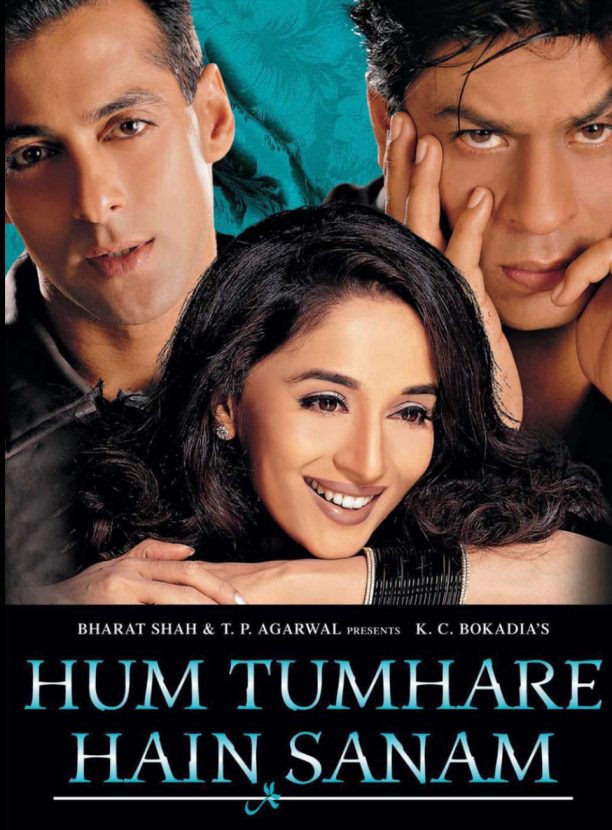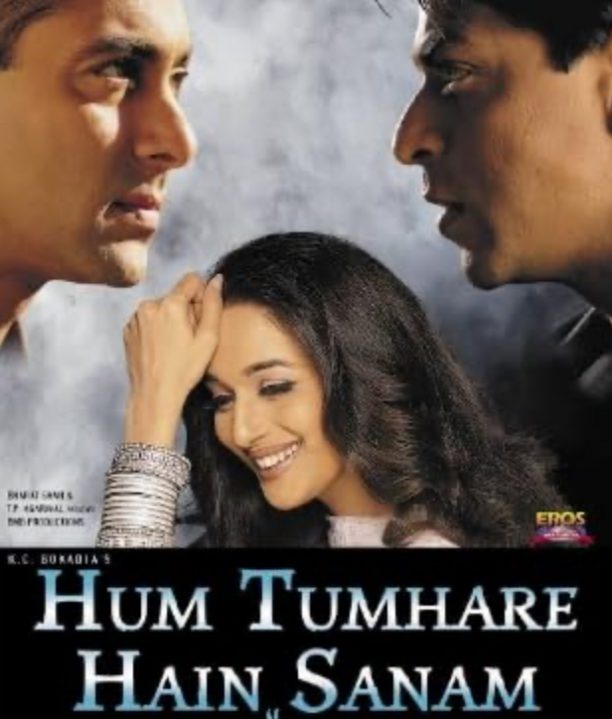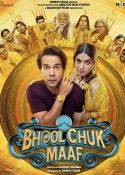 Subhash K Jha turns the focus on Hum Tumhare Hain Sanam, which featured the epic cast of Shah Rukh Khan, Salman Khan, and Madhuri Dixit, that released in 2002.
Subhash K Jha turns the focus on Hum Tumhare Hain Sanam, which featured the epic cast of Shah Rukh Khan, Salman Khan, and Madhuri Dixit, that released in 2002.
The love triangle about a jealous husband(Shah Rukh Khan), his devoted wife (Madhuri Dixit), and a supportive friend (Salman Khan) who’s mistaken for the wife’s lover by her husband, seeks inspiration from a 1974 Rajesh Khanna-Mumtaz-Sanjeev Kumar starrer Aap Ki Kasam. In Hum Tumhare Hain Sanam, the ornate packaging, top-heavy star cast, and the outmoded conventions of marital obligations and fidelity had the film trade very worried.
Though Madhuri hadn’t had much luck with Shah Rukh, she had a historic hit Hum Aapke Hain Koun with Salman Khan.
The film wasn’t only crucial for the doddering fortunes of multi-starrers but also for producer K.C. Bokadia, whose career fell on hard times in the 1990s after a couple of big hits Aaj Ka Arjun and Phool Baney Angaaray in the 1980s. Because of Bokadia’s financial crises, Hum Tumhare Hain Sanam was delayed by almost six years.
It marked the belated directorial debut of the Tamil director K.S. Adhiyaman, who, incidentally, directed Hum Tumhare Hain Sanam without knowing a word of Hindi. A lot of styles and trends have changed since Hum Tumhare Hain Sanam began shooting.
If nowhere else, this long-delayed marital triangle clicker in Bihar where a jealous Shah Rukh Khan goes into a dream sequence where he imagines his wife Madhuri Dixit cooing “Gale mein laal tai” to Salman Khan.
Seven years in the making, Hum Tumhare Hain Sanam makes us ‘grown’ in exasperation. All the actors have grown; some have even outgrown this marital drama. Only Hindi debutant Adhiyaman has stuck on, plodding through the over-stressed, under-intellectualized story of an over-possessive and jealous husband who nearly wrecks his marriage to a rather domesticated and dimwitted woman who can’t see how much her husband resents her proximity to her childhood chum until it’s almost too late.
Shah Rukh Khan is the obsessive spouse whose suspicions begin to tear into the innards of his marriage. In all fairness, the film ‘belongs’ to Shah Rukh, much in the same way that Sangam belonged to Raj Kapoor. Adhiyaman pays more than a nodding homage to Raj Kapoor’s Sangam. Not only is the theme of spousal suspicion caused by an old childhood chum borrowed from RK’s immortal love triangle, but even the couple is named Gopal and Radha, a la Sangam, with the unintentionally intrusive friend’s name altered from Rajendra Kumar’s Sunder to Salman Khan’s more macho Suraj.
There are loads of other characters tucked into every nook and cranny of this over-stuffed masala dosa, more sambhar than sombre. Even the music directors come in a bunch. The credit titles impatiently club them together as “6 Top Music Directors”. Creating an exceptionally atonal music score, we might add.
In fact the same applies to the film. Crammed with characters and ideas, it gives off an uneasily discordant tone.
Adhiyaman errs in overreaching. The film tries to be a bit of everything and ends up being nothing. While the Gopal-Radha marriage comes apart because of Suraj, it also bears the brunt of a serious domestic friction when Radha’s much-adored wastrel of a brother Prashant (Atul Agnihotri) clashes with Gopal’s laadli sister Neeta (Suman Ranganathan). With the narrative pulling in two different genres, the film begins to resemble a waiting room at a railway station where transit passengers lose all their inhibitions and vanish into the night.
The peripheral characters such as Shah Rukh Khan’s foster father (Alok Nath), Madhuri’s mother (Aruna Irani), or Shah Rukh’s divorced colleague and suggestively friendly secretary aren’t meshed sensibly into the plot.
Adhiyaman’s melodramatic motivations should have been allowed to converge only on the central triangle. He should’ve concentrated on making a marital drama instead of a family flick. With a bit of firm control, the pati, patni, and their woe theme would have acquired engrossing dimensions. The three main players are competent enough to add invisible shades to their characters. Shah Rukh is especially in character– tense, edgy, jittery, impatient, and craving to get his wife’s undivided attention. He handles both the light-hearted exasperation (in the scene where Salman calls in the night to tell Madhuri he’s got diarrhoea, Shah Rukh’s spousal indignation is brilliantly portrayed) and the grim and damning confrontation scenes (such as the one wherein one dam-burst he blurts out all his irate resentment against his wife’s sunny friendship with her childhood chum) in equal measures.
Tragically, the possessive husband’s character becomes a casualty of histrionic exhibitionism. After playing the possessive husband’s character, the character progressively begins to play Shah Rukh Khan. The improvisational sequence where Shah Rukh Khan “speaks” to a clay horse is an item rather than a sequence in the film.
Salman is surprisingly subdued. He doesn’t bare his chest, even in jest. And when he begins to do so in front of Madhuri Dixit, Shah Rukh berates his co-star for being a bodybuilder and a showoff. Aishwarya Rai’s guest appearance as Salman’s blind girlfriend who can “see” into his pure intentions about Madhuri is well planned and comes at the right juncture.
The intentional humour in some of the dramatic moments, such as the sequence in a bar where Gopal chastises an unfaithful wife, keeps us looking at the proceedings with passing curiosity rather than surpassing interest.
For a film where one of the heroes plays a professional singer, the music and choreography are abysmally inadequate , if not downright ridiculous. The song –and- dance that Salman performs when he wins the Singer Of The Millennium award is so pitiable the judges would surely be tempted to take back the award.
The passage of time has also taken its toll on the narrative. Though fortunately the actors don’t change their hairstyle in every sequence Madhuri Dixit’s makep goes from natural to chalky white. The print quality is also inconsistent and just for the sake of being an accommodating movie viewer, one could say it reflects the mood of the jealous husband. Also, for a film that pitches its moral values and marital thesis primarily at a woman’s audience the humour often gets coloured and suggestive.
There’s a sequence where Radha wants to “play football” with Gopal in the middle of the night. “Not now, I’ve got a foot ache,” Shah Rukh adlibs. Sure, and we get a stomach ache instead of pain in the nether regions watching three myopic people resolve a self-created messy triangle.










